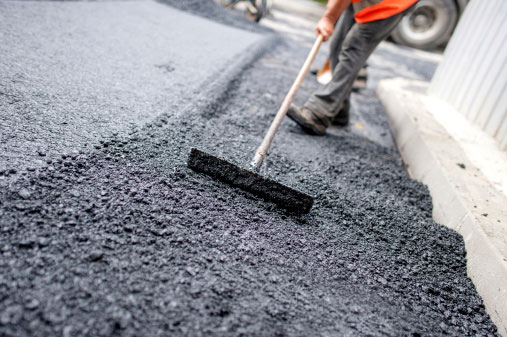Seal in Quality: Professional Solutions for Asphalt Repair and Sealing
Seal in Quality: Professional Solutions for Asphalt Repair and Sealing
Blog Article
Cold Mix Asphalt Vs. Hot Mix Asphalt: Which Is Right for You?

Make-up Differences
Cold mix asphalt is produced by emulsifying the asphalt binder with water and an emulsifying agent before blending it with accumulation. The hot mix asphalt production process involves warming the accumulation and asphalt binder individually before integrating them at the asphalt plant.
Furthermore, chilly mix asphalt has a tendency to be much less thick and a lot more flexible than hot mix asphalt. This versatility makes it much better matched for locations with greater levels of movement, such as driveways or roadways with rush hour. In comparison, hot mix asphalt is recognized for its high resilience and resistance to rutting and breaking, making it a preferred choice for highways and high-traffic roads where longevity is important.
Setup Process Variations
The process of setting up chilly mix and warm mix asphalt shows remarkable variations in their procedures and demands. In contrast, warm mix asphalt requires an extra sophisticated installation process. Due to the heating needs, hot mix asphalt installations are normally carried out by experts with specialized equipment, making sure a more permanent and structurally sound outcome.
Longevity and Longevity Factors
When taking into consideration asphalt choices, resilience and durability are crucial aspects to evaluate for long-term sidewalk efficiency. Hot mix asphalt (HMA) is understood for its phenomenal durability and longevity.
In regards to durability, HMA commonly outperforms CMA as a result of its remarkable strength and resistance residential or commercial properties. HMA sidewalks have a longer life span, needing much less constant fixings and upkeep, which can equate to cost financial savings over time. In addition, HMA pavements are more conveniently adjustable to fulfill certain job requirements, even more boosting their durability.
Expense Considerations
Considering the monetary implications is an essential facet when evaluating the selection between view website warm mix asphalt (HMA) and cold mix asphalt (CMA) for pavement jobs. While the preliminary cost of hot mix asphalt is normally higher than that of chilly mix asphalt, his explanation HMA often supplies an extra cost-efficient service in the lengthy run due to its remarkable toughness and durability.
Along with product prices, it's vital to think about the costs linked with installation and upkeep when comparing HMA and CMA. HMA normally calls for specialized tools and competent labor for appropriate installment, which can affect general task prices. Alternatively, CMA is less complicated to collaborate with and can usually be used utilizing easier strategies, possibly decreasing setup costs. Ultimately, the decision between HMA and CMA ought to take into consideration not just the first cost hop over to these guys but additionally the lasting monetary implications to identify the most economical choice for the specific sidewalk project.
Environmental Effect Contrast
Comparison of the ecological influences between warm mix asphalt (HMA) and chilly mix asphalt (CMA) reveals distinctive differences in sustainability methods. HMA manufacturing calls for heats, causing enhanced energy intake and greenhouse gas emissions. The procedure likewise launches volatile organic compounds (VOCs) and harmful air pollutants (HAPs) right into the atmosphere. On the other hand, CMA is produced and used at lower temperatures, minimizing energy usage and discharges dramatically. The lower production temperature levels of CMA lead to lowered gas consumption and reduced levels of carbon dioxide emissions, making it an extra eco friendly alternative.
In addition, the use of CMA frequently includes reusing existing asphalt sidewalk, promoting source conservation and reducing the amount of waste sent to land fills. By choosing for CMA over HMA, road building and construction tasks can contribute positively to environmental conservation efforts.
Final Thought
To conclude, the choice between cold mix asphalt (CMA) and hot mix asphalt (HMA) relies on different elements such as composition, installation procedure, toughness, longevity, expense, and ecological impact. asphalt repair. While CMA uses a quick and economical option for small fixings, HMA ensures remarkable resilience and durability for rush hour areas. Consider these aspects thoroughly to figure out which sort of asphalt is the right option for your paving requires

Thinking about the monetary effects is an important facet when assessing the option between hot mix asphalt (HMA) and cool mix asphalt (CMA) for pavement projects. While the preliminary cost of warm mix asphalt is generally greater than that of cold mix asphalt, HMA typically gives an extra cost-effective service in the long run due to its premium sturdiness and long life. cold mix asphalt.Comparison of the ecological impacts in between warm mix asphalt (HMA) and chilly mix asphalt (CMA) exposes distinct differences in sustainability methods.In conclusion, the selection in between cool mix asphalt (CMA) and warm mix asphalt (HMA) depends on various elements such as make-up, setup procedure, toughness, durability, cost, and environmental influence
Report this page